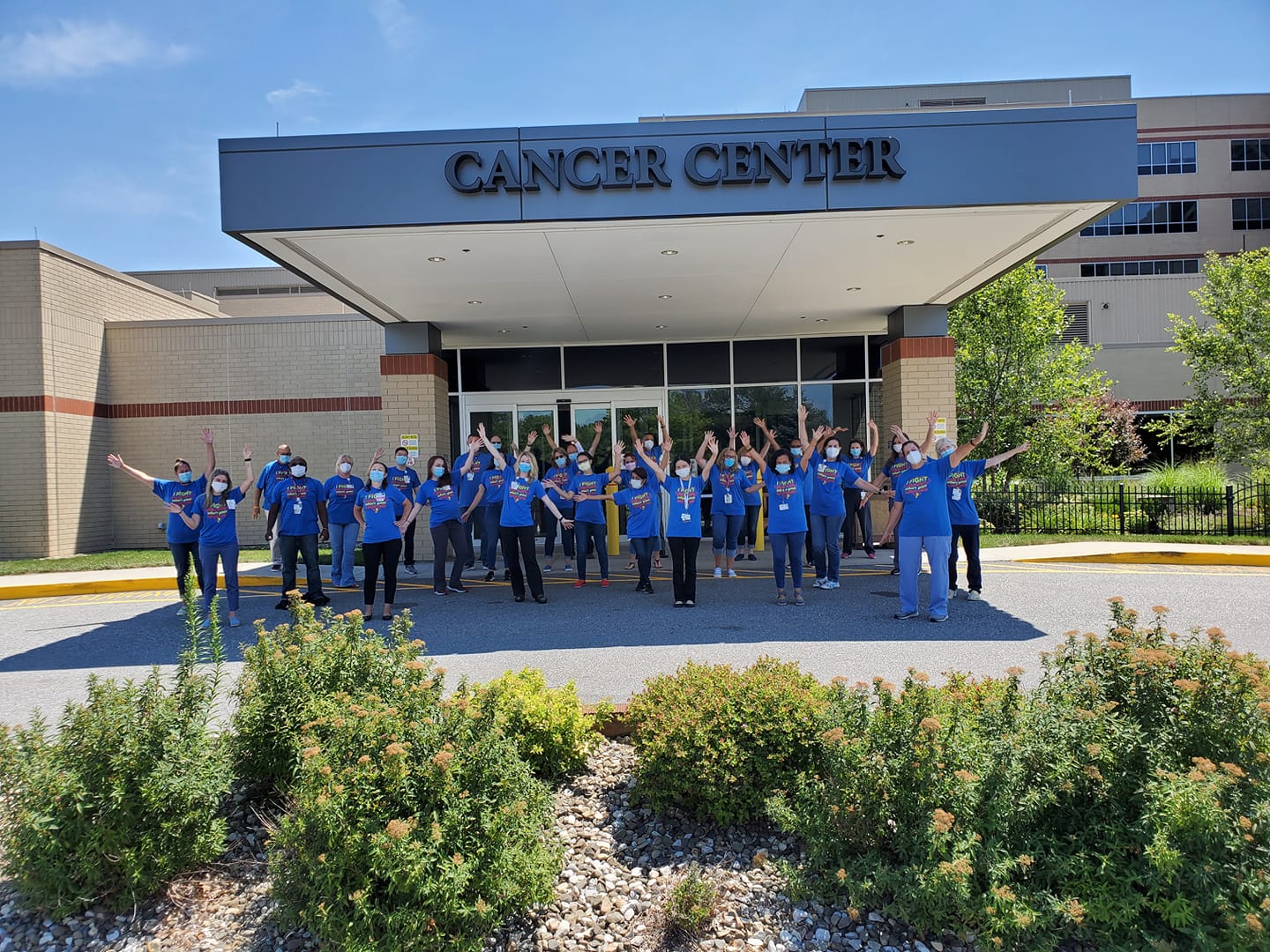Thyroid Cancer
Garnet Health provides comprehensive diagnostic, treatment and supportive care services for thyroid cancers in Orange and Sullivan Counties.
Find a Provider Location SearchBody
Thyroid Cancer & Disease at Garnet Health
Thyroid cancer is a type of cancer that is found within the thyroid gland and usually forms as a lump or nodule in the neck. The most common types of thyroid cancers are:
- Papillary carcinoma - the most common type of thyroid cancer (70 percent) and is most often curable and may spread to the lymph nodes.
- Follicular cancer - the second most common thyroid cancer (10 to 15 percent) and is usually curable. It may spread to lungs and bones.
- Medullary Thyroid Carcinoma - An aggressive, rare cancer that may be familial or sporadic. This cancer rapidly spreads to lymph nodes or other organs.
- Anaplastic Carcinoma - A very rare and highly invasive form of thyroid cancer that is often deadly.
Most thyroid nodules are not cancerous and are about three times common in women than men. Thyroid cancer is commonly diagnosed at a younger age than most other adult cancers.
Symptoms, such as the ones below, do not mean that you have thyroid cancer. If present, your doctor should further evaluate you with a physical examination and diagnostic imaging. Many people with thyroid cancer do not have any symptoms and some cancers are found on imaging tests performed for other reasons.
- Neck lumps
- Hoarseness
- Difficulty swallowing or breathing
- Persistent throat or neck pain
- Persistent cough
- Diagnosis of a thyroid cancer
Lumps in the thyroid gland, or nodules, are extremely common; five to 10 percent of people will develop a palpable thyroid nodule sometime in their life. Most thyroid nodules are harmless, but some may cause problems. Occasionally nodules will produce a thyroid hormone independent of the body's need, leading to hyperthyroidism. Larger nodules can also cause a feeling of pressure or fullness in the neck, shortness of breath, difficulty swallowing or pain in the neck, jaw or ear. Although nodules are usually noncancerous (benign), about five percent are cancerous.
Thyroid Cancer Treatment Options
At Garnet Health, we're dedicated to comprehensive and customized care for people with thyroid cancer and disease. We are committed to providing patients and their families with the highest quality and most comprehensive care available. We employ cutting-edge technologies through every phase of treatment.
For thyroid cancer, our most common treatments, surgeries and procedures include:
- Thyroidectomy Surgery - The range of thyroid surgery extends from a lobectomy (removal of a half of a gland) to a subtotal thyroidectomy (leaving a strip of tissue next to the nerve) to a total thyroidectomy. In the United States, most patients will undergo a total removal of the gland. Removal of a half of a thyroid is generally reserved for benign (non-cancerous disease) or non-diagnostic preoperative biopsy. Patients with thyroid cancer may also require a neck dissection (removal of the lymph nodes) to increase their healing process as opposed to their cure rate. The size of the incision will depend on the surgical approach that the surgeon chooses to employ. Generally, patients with large glands; large nodules; Hashimoto’s disease; thyroid cancer; heavy set neck and previous operations may not be candidates for a minimal access approach and may need a larger incision. A typical thyroid incision is about 2 to 3 inches, whereas a typical minimal access scar is between ¾ inch to 1 ½ inches. The duration of a thyroid/parathyroid surgery has many variables and your surgeon will discuss surgical time as it applies to your particular case.
- Radioactive Iodine Ablation - Radioactive iodine treatment is administered after thyroid surgery to higher risk patients by a radiation oncologist to eradicate residual thyroid tissue after surgery or to treat thyroid cancer that has spread to other regions.
- Parathyroidectomy - A surgical procedure used to remove a malfunctioning parathyroid gland. Most people (80 percent) will have one affected gland, however about 10 to 15 percent of patients will have four affected glands, and about two to five percent will have two glands. In the case of a well localized single gland disease, a small incision can be made. However, if a gland is not found on preoperative imaging or more than one gland is affected, a more involved exploration on both sides of the neck may be needed.
- Hormonal Suppression Therapy - While all patients who have their entire thyroid gland removed take thyroid hormone medication, higher risk patients with thyroid cancers, take higher than normal doses of thyroid hormone to suppress growth signals to the thyroid (TSH).
- Fine Needle Aspiration - Fine Needle Aspiration (FNA) is the most accurate and useful method to evaluate a thyroid nodule for cancer. FNA is a very safe and well-tolerated procedure in which a thin needle is inserted in the nodule to obtain a sample of cells for analysis. Often an ultrasound is used to ensure that the needle is placed accurately within the nodule. The procedure is usually performed by an interventional radiologist, endocrinologist or thyroid surgeon.
Cancer Treatment Services
Our goal is to provide excellent clinical care and support for the whole person—we are here to help in the journey from cancer patient to cancer survivor.
Learn morePatient Information & Resources
We provide a variety of patient resources online regarding your patient rights, billing, and more - so you can get a jump start on your stay or appointment.
View ResourcesEducation & Support
From cancer support groups and screenings to our clinical trials program, we provide comprehensive cancer care. If you or a loved one has cancer, count on Garnet Health's experienced physicians, compassionate staff and live-saving technologies to fight the battle, together with you.
Locations
Spagnoli Family Cancer Center at Garnet Health Medical Center
707 East Main Street
Middletown, NY 10940
Oncology & Hematology Treatment Center at Garnet Health Medical Center - Catskills
68 Harris Bushville Road
Harris, NY 12742

